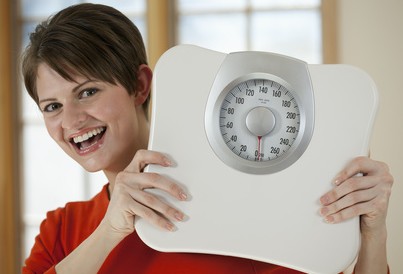Weight Loss Plateaus: How to reignite your weight loss
 Friday, January 27, 2012 at 7:59PM
Friday, January 27, 2012 at 7:59PM  A common development after a few weeks of losing weight is that your weight loss stalls, or stops. The scale isn’t budging. This situation—a weight loss plateau—has all kinds of mythology attributed to it.
A common development after a few weeks of losing weight is that your weight loss stalls, or stops. The scale isn’t budging. This situation—a weight loss plateau—has all kinds of mythology attributed to it.
When you start a diet, you reduce your intake of calories and a big part of that reduction is from carbohydrates. The reduction in carbohydrates leads to the depletion of glycogen (how your body stores sugar) from both your muscles and liver. Each gram of stored glycogen normally holds 3- to 4-grams of water with it.[i],[ii]
This is the mechanism behind most of the early weight loss at the beginning of any diet--anywhere from 50 to 75% of the scale loss is water! Low-carbohydrate (high-protein) diets especially accentuate early (excess) water losses because it takes as little as 3-days on a low carbohydrate meal plan to deplete two-thirds of muscle glycogen.[iii] That means when you start a diet, the first week or so it looks like you're losing way more weight than you actually are.
Fad diets are based on this trick, because initial calorie reductions produce the illusion of significant weight loss.[iv] This illusion, however, also leads to highly unrealistic expectations about ongoing weight loss!
Furthermore, when your glycogen stores are depleted from following that low carbohydrate diet, a carbohydrate binge will lead to excessive glycogen repletion (up to two times normal levels). And along with the glycogen, one heck of a water-weight-gain!
The take away: With early plateaus (around the 3rd or 4th week of dieting) just keep following your healthy eating and exercise plan and (assuming extra calories aren't creeping in) the scale will start dropping again. During this time you're still losing fat, which is the goal. It's just that the excess water loss from when you started is temporarily masking your current fat loss.
Plateaus can also happen later in the weight loss process. In previous post I addressed “understanding energy balance” for weight loss. The bummer is that your success at weight loss actually reduces your energy needs. That's normal, but it means to lose more weight you will have to adjust your intake lower and/or exercise more so that you are creating an energy deficit again.
For late process plateaus, start by reassessing the numbers. Be forwarned however, the reality is that adherance to lowered calorie intake typically starts sliding very early in the process and continues to escalate to the point where you are simply in energy balance (not creating an energy deficit).[iv] So, follow these steps:
-
 Reassess your minimum calorie needs: a quick thumbnail estimate is 11-calories-per-pound for women, or 12-calories-per-pound for men. [If you can, have your metabolism (resting metabolic rate) measured rather than use the estimate.] Then just decrease that number by 200- to 300-hundred calories (but don’t go below 1,200-calories for women, or 1,400 calories for men) and bump up your exercise (see the end of my article on fat-burning workouts, you should be burning a minimum of 2,000 calories a week).
Reassess your minimum calorie needs: a quick thumbnail estimate is 11-calories-per-pound for women, or 12-calories-per-pound for men. [If you can, have your metabolism (resting metabolic rate) measured rather than use the estimate.] Then just decrease that number by 200- to 300-hundred calories (but don’t go below 1,200-calories for women, or 1,400 calories for men) and bump up your exercise (see the end of my article on fat-burning workouts, you should be burning a minimum of 2,000 calories a week).
- If you thought you were already within the above range, but not losing weight, then it's time to assess how accurately you're tracking your intake. Are you weighing and measuring? Are you writing in your food log within 15-minutes of eating? Are you over estimating your physical activity expenditure? It's not unusual to underestimate your intake by 20- to 50%.[vi],[vii] You can't fool Mother Nature! Choose to put in the time and effort needed for accuracy, and the scale will respond.
- If the scale still seems stuck you may want to have your thyroid checked. If you have untreated (or undercorrected) hypothroidism your basal metabolic rate can be off enough that you--in fact--are not creating a negative energy balance.
These are complicated subjects that are hard to cover in a short format. Let me know what remaining questions you might have!
Best,
-Dorene
[i] Stubbs RJ. Carbohydrates and Energy Balance. Annals of the New York Academy of Sciences 1997;819:44-69.
[ii] Olsson DE, et al. Variation in Total Body Water with Muscle Glycogen Changes in Man. Acta Physiol Scand. 1970;80:11-18.
[iii] Bergstrom J, et al. Diet, Muscle Glycogen and Physical Performance. Acta Physiol Scand. 1967;71:140-150.
[iv] Hall, KD, et al. Quantification of the effect of energy imbalance on body weight. Lancet 2011;378:826-37.
[v ] Kreitzman SN, et al. Glycogen storage: illusion of easy weight loss, excessive weight regain, and distortions in estimates of body composition. Am J Clin Nutr 1992;56:292S-293S.
[vi] Kretsch MJ, et al. Behavioral and body size correlates of energy intake underreporting by obese and normal-weight women. J Am Diet Assoc. 1999;99:300-306.
[vii] Lichtman SW, et al. Discrepancy between self-reported and actual caloric intake and exercise in obese subjects. NEJM 1992;327:1893-1898.

Reader Comments